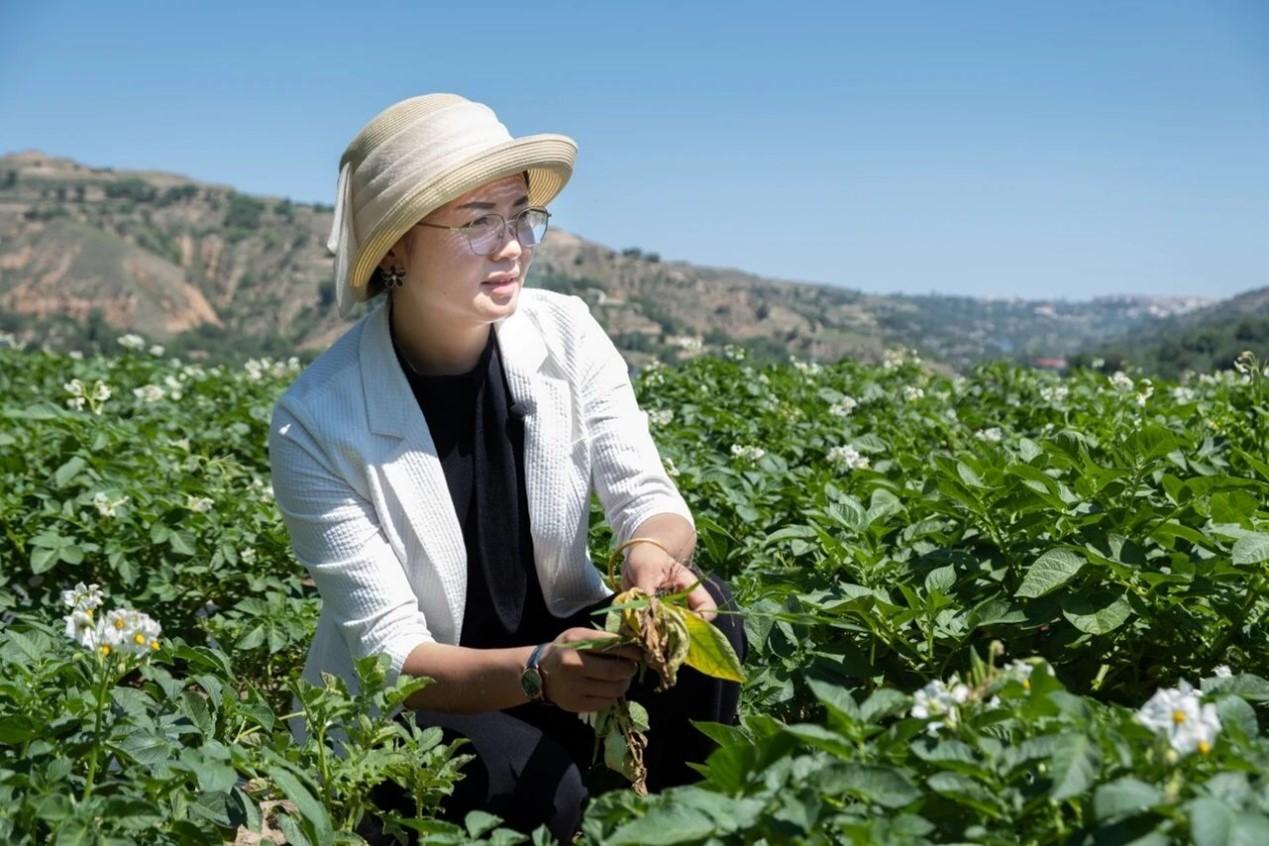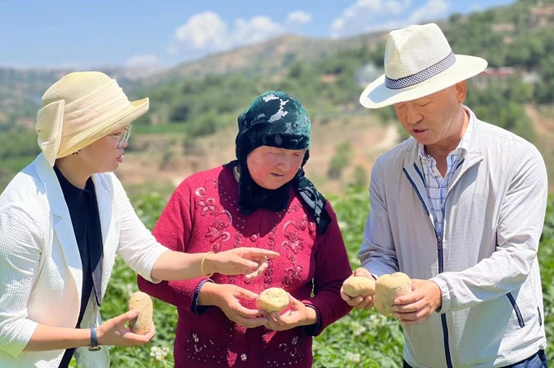
Li Yan, head of Dongjiagou Village, Dongling Township, Dongxiang Autonomous County, Linxia Hui Autonomous Prefecture, Gansu Province, and director of the local Ayisha Crop Cultivation and Livestock Farming Cooperative, which engages in endeavours such as lamb and potato farming as well as sericulture, examines potato plants. [Photo by Zhang Yiwen/WFP]
Women and girls in rural areas suffer disproportionately from multi-dimensional poverty, however. They may be as productive and enterprising as their male counterparts, but they are less able to access land, credit, agricultural inputs, markets, and high-value agrifood chains and tend to obtain lower prices for their crops.
Achieving gender equality and empowering women is thus a critical aspect of the fight against extreme poverty, hunger, and malnutrition in addition to being the right thing to do.
Li Yan, 39, head of Dongjiagou Village, Dongling Township, Dongxiang Autonomous County, Linxia Hui Autonomous Prefecture, Gansu Province, which is located in northwest China, is a woman leader who has been contributing to this undertaking.
Dongxiang Autonomous County features a typical Loess Plateau landscape of degraded and eroded silt-like sediment that is formed by the accumulation of wind-blown dust and a dry climate and is mostly inhabited by the Dongxiang, a Mongolic ethnic group that is one of China's 56 ethnic groups. Its residents primarily pursue craftsmanship and agriculture, growing crops such as maize, wheat, and potatoes, but have generally relied on manual labour and animal power when growing crops in the numerous deep gullies and on the many mountains in the area, resulting in high inputs being required and low output being achieved. Factors such as a lack of quality transportation networks and natural resources have contributed to extreme poverty in the area.
Most young and middle-aged men leave their hometowns in order to work in areas that are more prosperous, but low levels of education and societal expectations to take care of their families in accordance with traditional norms restrict the ability of most of the women who are born there to follow suit. These rural women thus constitute one of the most vulnerable groups in Chinese society.
In March 2014, Li established the Ayisha Crop Cultivation and Livestock Farming Cooperative with four partners in order to empower women farmers by helping them develop the local lamb industry so that they could improve their economic well-being and quality of life since almost every household in the area was already involved with it.

Li (left) and a member of the Ayisha Crop Cultivation and Livestock Farming Cooperative (middle) discuss potato production with Zhao Guibin, director of the World Food Programme (WFP) Zinc-enriched Potato Project in Gansu. [Photo by Zhang Yiwen/WFP]
The project helps smallholder households produce zinc-enriched potatoes and promotes the establishment of related value chains in order to improve nutrition, boost incomes, and enhance resilience to climate change via the provision of technical training pertaining to the cultivation and storage of the crop, the establishment of relevant standards, enhancement of nutritional awareness through the development and distribution of diet and nutrition guides and other methods, brand building, marketing campaigns on TV and other media, livestreams that cover zinc-enriched potato production techniques and nutritional information on platforms such as TikTok, arrangement of purchase agreements, and other undertakings.
A cooperative endeavour involving China's Ministry of Agriculture and Rural Affairs, the Gansu provincial government, and several agricultural and science institutions, the project was designed to benefit the 3,000-plus smallholder farming households living in deeply impoverished parts of Dongxiang and Dingxi City's Anding District, which is also part of Gansu and is located about 2.5 hours east of the autonomous county, that are involved and improve the nutritional status of consumers in rural parts of the province and other areas.
The Ayisha Crop Cultivation and Livestock Farming Cooperative's leaders applied for the organisation to be included in the United Nations World Food Programme (WFP) Zinc-enriched Potato Project in Gansu shortly after it was launched when they became aware of the fact that it benefits and prioritises women and children. Village officials began visiting women in Dongjiagou and explaining plans and policies pertaining to the creation of a zinc-enriched potato farming base and the benefits of working at home under Li's guidance in order to entice them to take part in the project. She eventually spearheaded a campaign to grade the uneven agricultural land that exists in the area and pave roads to every individual parcel using rented equipment that the Ayisha Crop Cultivation and Livestock Farming Cooperative's members participated in in order to lay the foundation for the base.
Li also arranged for agricultural experts to hold free potato farming training classes at the cooperative and hands-on training courses in the fields and even took members of the organisation and some of the farmers that are involved with it to an agricultural training centre located outside Dongjiagou in order to ensure that they were proficient with potato farming techniques and procedures related to areas such as sowing, fertilising, weeding, and harvesting and distributed seed, pesticide, and other materials to them.
One hundred and one female residents and a male resident of Dongjiagou are members of the Ayisha Crop Cultivation and Livestock Farming Cooperative and grow zinc-enriched potatoes across 400 mu of land using scientific techniques and mechanised approaches as of November 2023. An additional 243 residents of three villages located nearby lease their land usage rights to the organisation and grow zinc-enriched potatoes across 1,600 mu of land, 400 mu of which are mechanised, and engage in lamb and silk farming in cooperation with it as well as of the same point in time. The cooperative has also constructed relevant storage and preservation warehouses and has been building a potato brand and helps its members and partners store and sell their produce. These types of measures have proven to be effective ways to help guarantee basic income for the organisation's members and the people who work with it.
For more information, please contact WFP China COE (wfpcn.coe@wfp.org)

Category
Female Entrepreneur Helps Impoverished County Residents Pursue Zinc-enriched Potato Farming
Contributor
Female Entrepreneur Helps Impoverished County Residents Pursue Zinc-enriched Potato Farming
Country
Story

